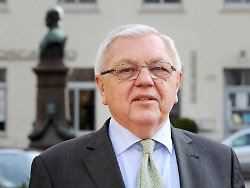After just one year, the former Bundeswehr general Harald Kujat resigned from his position as head of the Heckler & Koch supervisory board. His career in business starts promisingly, but then the ex-military gets into an internal power struggle until he finally surrenders.
For the general, it was an absenteeism: When the weapons manufacturer Heckler & Koch (H&K) held its online general meeting, its supervisory board chairman Harald Kujat was not there – actually he should have chaired the meeting. But the once highest NATO military and former inspector general of the Bundeswehr had previously announced his resignation, and this came into effect at the end of the shareholders' meeting.
Worn down by an internal power struggle and faced with the threat of being voted out of office, the 78-year-old drew a line under a chapter that was all in all a painful defeat for him. When the eloquent military expert came to the top of the supervisory board a year ago and thus took up his first post in the private sector, it was perceived as a clever move. The company wants to polish up its tarnished image, said industry experts.
Just a few months earlier, the company had been sentenced to pay 3.7 million euros for illegal arms deliveries to troubled Mexican provinces. In addition, the experts speculated that the Kujat personnel could have a positive effect in the race for a 250 million euro major assault rifle order from the federal government for the German armed forces. H&K is still waiting for a decision from Berlin on the Bundeswehr order, but it could finally come in autumn.
A power struggle is raging in the background
Meanwhile, the retired general got caught in the crossfire of a power struggle that he hadn't seen coming. On one side of the dispute stood the long-time majority owner Andreas Heeschen, on the other side a Luxembourg financial holding company called CDE, backed by the French Nicholas Walewski. Originally, both had pulled together: In 2015, the CDE helped financially and received a large block of shares from Heeschen as a pledge.
The CDE wanted to redeem this pledge, but Heeschen wanted to keep the voting rights. The German hoped that Berlin would veto the takeover by a foreign company. In addition to Walewski, another Frenchman who lives on the Caribbean island of Barbados plays a role at the CDE. According to a publication in the Federal Gazette on Tuesday, a company named Sofi Kapital based on this island has indirect influence on H&K, indirectly through its involvement with the CDE. In the words of H&K board boss Jens Bodo Koch, Sofi Kapital "dominates" the CDE. That means that a company from the Caribbean is also involved in the German armory. Despite these interrelations, the federal government waived a veto, and the CDE was able to take over the majority in mid-July.
For Kujat, the CDE's new role was bad news. Because he was assigned to the Heeschen camp. The CDE targeted him and accused him of lacking economic knowledge. In December 2019, the Luxembourg company wanted to vote out Kujat, but at that time it was only a minority shareholder – it failed, Kujat remained in office thanks to Heeschen's backing. This backing did not bring the general anything more, however, when Heeschen's company share shrank in July and the CDE took over the scepter.
While the new major shareholder caused deep worry lines at the General, the German CEO Jens Bodo Koch was in a good mood. In his opinion, financially strong investors are important to support the highly indebted company. For the board of directors and the workforce, the CDE is "a tailwind on the path to further recovery of our company," said Koch.
Upward trend despite mountain of debt
In fact, the long-established company is on the economic upswing, in the first half of the year the surplus even skyrocketed from 0.4 million euros in the same period last year to 7.6 million euros. Sales rose from 126.7 to 139.5 million euros. The still high mountain of debt, which in mid-2020 was 249 million euros according to the board of directors, is worrying.
General Kujat's foray into the private sector ended at 2 p.m. today – at the end of the event, his resignation took effect and he was vacant. And what does he say in retrospect – was it a mistake that he embarked on the adventure of H&K? "I was very happy to take on this post because I was of the opinion that it was an important company for the security of Germany and that the Bundeswehr got the best and most modern equipment – I wanted to make a contribution to that," he said. "Now things have turned out differently than expected – that's just the way it is in life, and that's it."
It is still unclear who will succeed him in the post of H&K executive chair. At the suggestion of the board, a court should now name a successor. This is likely to become an expert who is hardly known to the public. There should be no more attempt by the company to show off with a colorful personality.
. (tagsToTranslate) Economy (t) Heckler & Koch (t) Bundeswehr (t) Armaments industry
